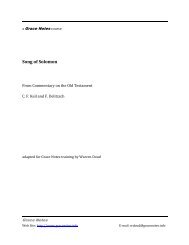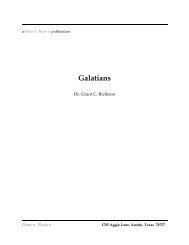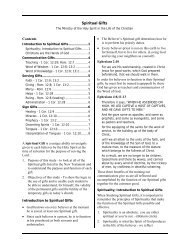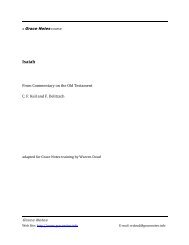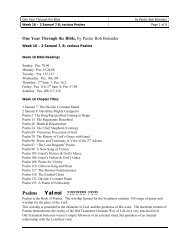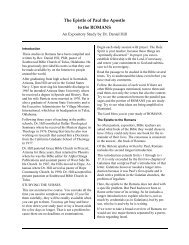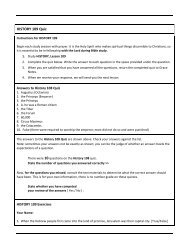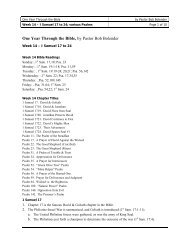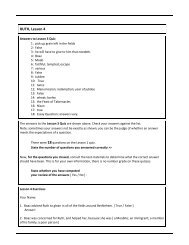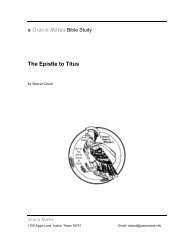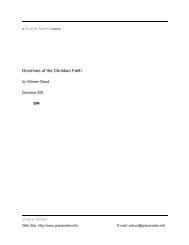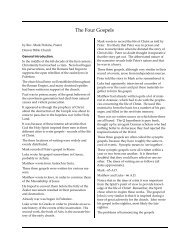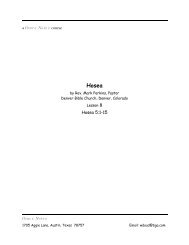Create successful ePaper yourself
Turn your PDF publications into a flip-book with our unique Google optimized e-Paper software.
<strong>Apostolic</strong> <strong>Fathers</strong> 14which Papias claims to draw much of hisinformation from “the presbyters” or theirfollowers concerning what the Lord’s discipleshad said or were saying (iii.39.1–4). Eusebiusargues that this puts intermediaries betweenPapias and the apostles. But the case is notconclusive, for a few lines later Eusebiushimself speaks of “the apostles” and “theirfollowers” (iii.39.7), apparently as aclarification of Papias’ reference to thepresbyters and their followers. It is hard toavoid the conclusion that for Eusebius no lessthan for Papias, “presbyters” and “apostles” canbe used interchangeably. This raises a seriousquestion about Eusebius’ effort in the context todraw a sharp distinction between the two,especially between John the apostle (whomPapias mentions with other members of theTwelve), and John the presbyter (named with acertain Aristion as Papias’ contemporary).Many theories have been built on Eusebius’exegesis here, but it should not be too quicklyassumed that two Johns are mentioned,especially since: (a) both times the nameoccurs, it refers to a “disciple of the Lord,” and(b) both times it is found in close associationwith “presbyter.” It is clear that Eusebius is notself-consistent at this point, and the traditionalview that Papias speaks of the aged apostleJohn first as a man of the past and then as acontemporary should not be summarily ruledout. All this has considerable bearing on thetraditions about the Fourth Gospel, but doesnot enable us to fix the role of Papias with anyexactness. Whether mediated by “presbyters”or simply by “followers,” Papias’ knowledgedoes seem to be at least once removed from theapostles themselves. In this respect Eusebius isright.Another tradition preserved by Papiasdescribes the Gospels of Mark and Matthew.According to Eusebius, Papias attributes to “thePresbyter” a statement that Mark presented hisGospel without making an orderedarrangement of what Jesus had said and done.He simply followed the oral teaching of Peter,becoming in effect Peter’s recorder (HEiii.39.15). Matthew on the other hand did whatMark did not do: he made an orderedarrangement of the gospel in the Hebrewlanguage (or a Hebraic style). Thus each ofthem presented the gospel according to thepossibilities open to him (iii.39.16). We have nostatement of Papias preserved about Luke andJohn, but the Gospels are presumably the“interpretations” or “presentations” which heproposes to supplement with the oral traditionsof the presbyters (iii.39.3). Though he does notdisdain the written Gospels, he attributes equalor greater authority to “the living and abidingvoice” of the apostles or of those who (likeMark) were their followers (iii. 39.4).Other statements attributed to Papias reflectthis interest in oral traditions. He cites, forexample, otherwise unknown sayings of Jesusabout a coming thousand-year reign on earth(iii.39.11f; cf. Rev. 20:1–6), and aboutunbelievably plentiful harvests of grapes andwheat on the earth in those days(IrenaeusAdvhaer v.33.3f, a traditionsupposedly from Jesus by way of John and the“presbyters”). He also preserves stories ofapostolic miracles involving in one case thedaughters of Philip (cf. Acts 21:8), and inanother the Justus Barsabbas of Acts 1:23f(EusebiusHE iii.39.8–10). He refers to anaccount of a woman accused of many sins in theLord’s presence (HE iii.39.17; cf. Jn. 7:53–8:11),and is said to have been responsible for aparticularly gruesome report of the death ofJudas Iscariot now found in commentaryfragments of a fourth-century writer namedApollinaris of Laodicea. A number of otherstatements are assigned to Papias by latehistorians and epitomists, including referencesto a martyrdom of the apostle John, and even alegend that Papias wrote the Gospel of John atthe apostle’s dictation! In such accounts theuncertainty about Papias himself iscompounded by the tendentious and confusinggrowth of legends about him and about theapostles he is supposed to have known.Largely because of his extravagant depictions ofmillennial plenty, Eusebius described Papias asa “man of very little intelligence” (HE iii.39.13).Though this verdict is perhaps unfair on suchlimited data, Papias seems to have been aperson who was fascinated by eschatologicalhopes, especially when they involvedextravagant and bizarre projections of certainfeatures of the present life into the future.



